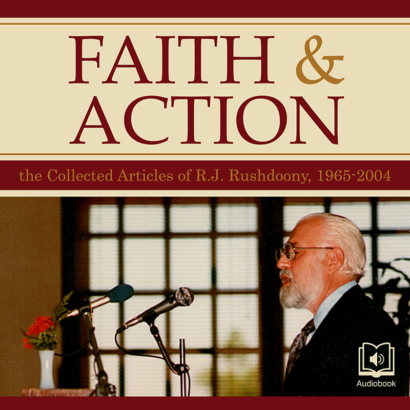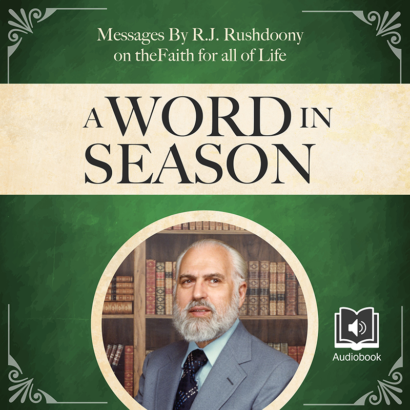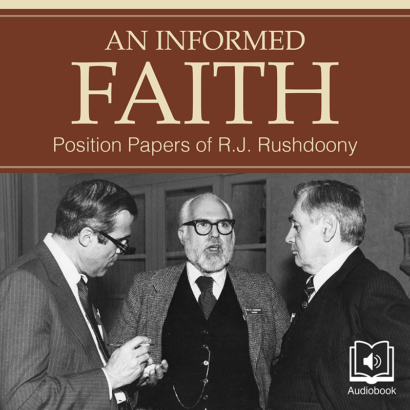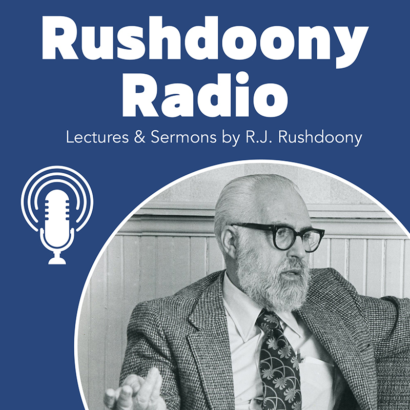
Up From Slavery
• Apr, 13 2024
In this episode of "The Last Kingdom," host Jeremy Walker delves into Booker T. Washington's autobiography "Up from Slavery," exploring his remarkable journey from slavery to becoming a pivotal educator and leader. Walker discusses Washington's core belief that personal character and integrity transcend circumstances, using his life to highlight themes of self-improvement and resilience against societal challenges. Through Washington's quotes and philosophies, the episode reflects on contemporary societal issues and emphasizes the enduring relevance of Washington's advocacy for education and moral development as foundational to personal and communal advancement.
Hosted by
Husband, Father, Pastor, Teacher, Podcaster, and Christian Education Advocate
- Series: The Last Kingdom
- Topics:
Jeremy Walker (00:22):
Welcome back to another episode of The Last Kingdom. I am your host, Jeremy Walker. This is episode number 12 for April the 12th, 2024, and this episode is entitled Up from Slavery. Join me as we discuss Booker T. Washington's famous book and, of course, many other topics. We had the death of O.J. Simpson this week. We had a solar eclipse. We had Dexter Reed being shot by police officers. We have congresswomen who think that it is racist to disagree with them or, of course, if you think that they should be handling funds properly.
(01:06):
Well, welcome, welcome back my friends to The Last Kingdom. I want to go ahead and start by pointing out one simple fact. America does not have a problem with race. There is not a racism problem in America. There is a desire to have a race problem in America today, but there is not one. We are going to be going over, and I want to be discussing the life of a wonderful man named Booker T. Washington. Most of you maybe are not familiar with him. He wrote many books, but one that I read a very long time ago was called Up from Slavery, and it was an autobiography of his life where he came from and, of course, what he saw was the path for not just people like himself who grew up in slavery in the actual time of slavery, but how it could not be a crutch. It did not have to be. Your circumstances would not dictate your level of success.
(02:15):
In his wonderful book, Up from Slavery, he had many memorable quotes and he did in many of his books. I want to share a couple of his quotes before we jump to some of our events and then get to the life of Booker T. Washington and how a man born in slavery in a nation that agreed with slavery, how can he grow out of slavery and be a success?
(02:44):
Well, let's start with some of his quotes that are famous. One of them is, "Character is power." That is a wonderful quote by Booker T. Washington focusing on the concept of character and how that is a source of a person's power, which comes from the inside. Booker T. Washington was a Christian, and when he talks about character, he's talking about Christian character. This is one of the reasons why Booker T. Washington is not mentioned or talked about in any circles, especially where the concept of slavery is concerned.
(03:24):
Let's move on to another quote from Booker. T Washington, quote, "Character, not circumstance, makes the person," unquote. Booker T. Washington was not a person who accepted the excuse that you are being held down by somebody or you are a victim of your circumstances. It doesn't matter if you are a Black man, it doesn't matter if you were or are a slave, that's where you came from or here in the year 2024, where none of us are in the situation of Booker, T. Washington, came from the circumstances that he came from, and none of us have any excuses when he would not give them to himself.
(04:06):
Let's do another quote, "I would prevent no man, no matter what his color might be, to narrow and degrade my soul by making me hate him," unquote. Booker T. Washington was not a person who believed that hatred towards others, even those that did you wrong, was the way up, was the way up for you as an individual, as a community, as a people potentially or as a nation. Hatred was never the way up.
(04:41):
Another quote from Booker T. Washington, "It is important and right that all privileges of law be ours, but it is vastly more important that we be prepared for the exercise of those privileges." That is an amazing quote because in the time of him, his people, the Black people of the day were not equal under law. They were slaves. They were just now being given their independence, being seen as citizens in the United States. He wanted all of his people, like all Americans, to be seen equal under the law, but he said it's more important than just getting these rights. It's knowing how to use them.
(05:26):
Now in 2024, you would swear, swear that people are being held down. It doesn't matter if they're Black or they're White or they're Hispanic or if they're Asian. Everybody wants an excuse of why they can't achieve success. If it's not because of slavery in the past that you weren't involved in, your parents weren't involved in, but Booker, T. Washington was and became a success, somehow he didn't see it as a hindrance, but people today just want to talk about it. Why? Because it's not really a problem.
(06:01):
Let's go ahead and talk about one of his other quotes. Booker T. Washington, quote, "There is another class of colored people who make a business of keeping the troubles, the wrongs, and the hardships of the Negro race before the public having learned that they are able to make a living out of their troubles. They have grown into the settled habit of advertising their wrongs, partly because they want sympathy and partly because it pays. Some of these people do not want the Negro to lose his grievances because they do not want to lose their jobs," unquote.
(06:40):
Booker T. Washington saw it as a negative for people to sit around and talk about all the terrible things that either legitimately happened to them or in their own imaginations happen to them. He saw these people as being passed bound. This kind of person, according to Booker T. Washington, can not succeed, not because he can't, but because he doesn't want to. He wants to have a pity party if there is something that legitimately happened to them, and that's all they want to do is focus on that all the time.
(07:14):
As a Christian, Booker T. Washington knew one thing. We are not bound to the past. In Christ, we have the power to overcome all things. Booker T. Washington's perspective is entirely Christian, and he was able to come up from slavery, though he grew up in it. He was a slave himself physically, but he wasn't one mentally or spiritually. When he was given his physical freedom, his family and his people, he wanted to raise them up, not just out of physical slavery, but mental and spiritual slavery as well.
(08:03):
The vast majority of people today, the only thing they can do is talk about all the things that Booker T. Washington said would make you not succeed in life because it's not just about your physical, physical freedom, but about your spiritual and intellectual freedom as well. Booker T. Washington found freedom while he was a slave, while his body was physically a slave. That man was not one. Booker T. Washington saw the freedom of all people to be self-driven primarily from the inside, the character of the man, and it does not matter, as he said, if you are not physically a slave. If you are a slave emotionally, intellectually, and primarily spiritually, then your physical freedom means nothing.
(08:59):
Booker T. is a phenomenal man. If people today would listen to him, they themselves could also come up from this emotional, intellectual, spiritual, and most certainly political slavery. That is what's happening in America today, a political slavery, a spiritual slavery, an intellectual slavery. The many things that he did, and I'm going to read that in a second, his life, the people that of our generations today could never succeed in his schools. If they went into the schools that Booker T. Washington built from the ground up as an amazing man giving no excuses, "Nobody's going to stop me," they would destroy everything he built because they are slaves spiritually, politically, and primarily religiously.
(10:01):
This is not a skin color that's a slave. Every single person, every single person that gives an excuse that's outside of themselves for why they don't succeed, why they don't grow, why they don't become better, they are slaves, and only Christ can free these people from their slavery, bring a people, a community, and a nation into the free world, but it has to be on God's terms.
(10:33):
The news of our day is filled with people like the death of O.J. Simpson. People were reminiscing about that trial where he was declared not guilty, and they weren't concerned about justice for the people who were murdered. They just wanted to see a Black man get away with murdering two White people. Now, does that sound like freemen to you, people that would excuse murder?
(11:04):
A young man, Dexter Reed, was shot to death by police this week. He was being pulled over in his car and he opened fire on police officers firing 11 bullets and, of course, the police officers fired back and he lost his life. The only thing they could talk about was how terrible it was that a Black youth was also gunned down by police. We have people like Maxine Waters, a congresswoman from California, who are openly stating that anybody who disagrees with her is racist, and when asked why are they racist, "Well," she said, "they're not saying racist things to me, but they only disagree with me because of the color of my skin." This is not a free person and what she is touting, trying to convince other people's of, these are not free people.
(11:52):
You have the right to disagree with somebody morally, and it doesn't make you hate the person because of their skin color. Free people are free to think according to God's commandments. They want these people to convince other people to stay slaves politically, religiously, and emotionally. They want you only to see the skin color and not the character. They don't want to have you be free. It doesn't matter if you're Black or White, Hispanic, Asian or where you come from. Slavery is not about people putting handcuffs on you and keeping you on the plantation. It is about keeping you trapped inside the box of sin, of hatred, and Booker T. Washington, an amazing man, not only came out of it himself, but tried to teach others how to do that as well.
(12:46):
So I wanted to go ahead and read from the tuskegeeinstitute.edu the life of Booker T. for those who have not read it. I want you to pay attention to what he says about what makes a free man. You look at a man like that who came out of slavery, his family came out of slavery, and he gave up hate, embraced the God of Scripture and came up from slavery, succeeded even in what people would call the most hateful times, and he was a success.
(13:24):
So what is your excuse? What is my excuse? What is any of our excuses? It doesn't matter what skin color we are. What is your excuse? You don't have one because your problem is sin. Your problem is not somebody else. Your problem is not your circumstance. Your problem is your character, just like Booker T. said, and there are people who want to Manipulate you, fool you, and keep you down by trying to convince you to be a sin eater, a person who just wants to run around and talk about the sins of others but not their own.
(14:03):
Well, that's not the way up from slavery. The way up from slavery is by keeping God's commandments, repenting of our sins, giving up hate and starting to love. Booker T. Washington loved other people and he hated when other people wanted to keep others down, specifically other Black folks just like him. He despised it.
(14:31):
So let's go ahead and read some of the life of Booker T. and let's see what you think. Listener, Booker T. and The Way Up. Born April 5th, 1856 in Franklin County, Virginia, Booker Taliaferro was the son of an unknown White man and Jane, an enslaved cook of James Burroughs, a small planter. Jane named her son Booker James Burroughs, but later dropped the second name. Booker gave himself the surname Washington when he first enrolled in school. sometime after Booker's birth, his mother was married to Washington Ferguson, a slave. A daughter, Amanda, was born to this marriage. James, Booker's younger half-brother was adopted. Booker's elder brother, John, was also the son of a White man.
(15:23):
Booker spent his first nine years as a slave on the Burroughs farm. In 1865, his mother took her children to Malden, West Virginia to join her husband who had gone there earlier and found work in the salt mines. At age nine, Booker was put to work packing salt. Between the ages of 10 and 12, he worked in a coal mine. He attended school while continuing to work in the mines. In 1871, he went to work as a houseboy for the wife of General Lewis Ruffner, owner of the mines. In 1872 at age 16, Booker T. Washington entered Hampton Normal, an agriculture institute in Virginia. The dominant personality at the school, which had opened in 1868 under the auspices of the American Missionary Association, was the principal Samuel Chapman Armstrong, the son of American missionaries in Hawaii. Armstrong, who had commanded Black troops in the Civil War, believed that the progress of freedmen and their descendants depended on education of a special sort, which would be practical and utilitarian, and would at the same time inculcate character and morality.
(16:37):
Washington traveled most of the distance from Malden to Hampton on foot, arriving penniless. His entrance examination to Hampton was to clean a room. The teacher inspected his work with a spotless white handkerchief. Booker was admitted. He was given work as a janitor to pay the cost of his room and board, and Armstrong arranged for a White benefactor to pay his tuition. At Hampton, Washington studied academic subjects and agriculture, which included work in the fields and the pigsties. He also learned lessons in personal cleanliness and good manners. His special interest was public speaking and debate. He was jubilant when he was chosen to speak at his commencement.
(17:22):
The most important part of his experience at Hampton was his association with Armstrong, who he described in his autobiography as a great man, the noblest, rarest human being it has ever been my privilege to meet. From Armstrong, Washington derived much of his educational philosophy. After graduating from Hampton with honors in 1875, Washington returned to Malden to teach. For eight months, he was a student at Wayland Seminary, an institution with a curriculum that was entirely academic. This experience reinforced his belief in educational system that emphasized practical skills and self-help.
(18:06):
In 1879, Washington returned to Hampton to teach in a program for American Indians. In 1880, a bill that included a yearly appropriation of 2,000 was passed by the Alabama State Legislature to establish a school for Blacks in Macon County. This action was generated by two men, Lewis Adams, a former slave, and George W. Campbell, a former slave owner. On February 12th, 1881, Governor Rufus Willis Cobb signed the bill into law establishing the Tuskegee Normal School for the training of Black teachers. Armstrong was invited to recommend a White teacher as a principal of the school. Instead, he suggested Washington, who was accepted.
(18:55):
When Washington arrived at Tuskegee, he found that no land or buildings had been acquired for the projected school, nor was there any money for these purposes since the appropriation was for salaries only. Undaunted, Washington began selling the ID of the school, recruiting students and seeking support of local Whites. The school opened July 4, 1881, and as shanty loaned by a Black church Butler A.M. Zion. With money borrowed from Hampton Institute's Treasurer, Washington purchased an abandoned 100-acre plantation on the outskirts of Tuskegee. Students built a kiln, made bricks for buildings and sold bricks to raise money. Within a few years, they built a classroom building, a dining hall, a girls' dormitory, and a chapel.
(19:45):
By 1888, the 540-acre Tuskegee Normal and Industrial Institute had an enrollment of more than 400 and offered training in such skilled trades as carpentry, cabinet-making, printing, shoemaking, and tinsmithing. Boys also studied farming and dairying, while girls learned such domestic skills as cooking and sewing. Through their own labor, students supplied a large part of the needs of the school. In the academic departments, Washington insisted that efforts be made to relate the subject matter to the actual experiences of the students. Strong emphasis was placed on personal hygiene, manners, and character building.
(20:31):
Students followed a rigid schedule of study and work, arising at 5:00 in the morning and retiring at 9:30 at night. Although Tuskegee was non-denominational, all students were required to attend chapel daily and a series of religious services on Sunday. Washington himself usually spoke to the students on Sunday evening. On Tuskegee's 25th anniversary, Washington had transformed an idea into a 2,000-acre 83-building campus that combined with such personal property as equipment, livestock, and stock and trade was valued at $831,895. Tuskegee's Endowment Fund was $1,275,644 and training in 37 industries was available for more than 1,500 students enrolled that year.
(21:29):
Through progress at Tuskegee, Washington showed that oppressed people could advance. His concept of practical education was a contribution to the general field of education. His writings, which included 40 books, were widely read and highly regarded. Washington settled into the national scene on opening day of the Atlanta Exposition in 1895 when he spoke about the new Negro, one with the knowledge of how to live, how to cultivate the soil, to husband their resources and make the most of their opportunities.
(22:06):
Eyebrows raised again, October 16, 1901 when Washington became the first Black person to dine at the White House. Council to many US presidents, he was there at the invitation of President Theodore Roosevelt. Washington was married three times. In 1882, he married his Malden sweetheart, Fannie Norton Smith. She died two years later leaving an infant daughter, Portia, who married William Sidney Pittman, an architect in 1907. In 1885, Washington married Hampton graduate, Olivia Davidson, the assistant principal of Tuskegee who died in 1889. Two sons were born to this marriage, Booker Taliaferro, Jr. and Ernest Davidson.
(22:53):
In 1893, Washington married Fisk University graduate Margaret James Murray, who had come to Tuskegee as lady principal in 1889 and directed the programs for female students and initiated the woman's meetings. Margaret Murray Washington died 1925. Margaret and her husband's three children and four grandchildren survived Washington, who died November 14th, 1915 at age 59 of osteochlorosis and exhaustion. He died after an illness in St. Luke's Hospital, New York City, where he had been admitted on November 5th. Aware that the end was near, he left with his wife and his physician, Dr. John A. Kennedy, Sr. on November 12th so that he could die in Tuskegee. Booker T. Washington's funeral on November 17th, 1915 was held in a Tuskegee Institute chapel, and was attended by nearly 8,000 people. He was buried on campus in a brick tomb made by his students on a hill commanding a view of the entire campus.
(23:59):
I hope this has given you something to be inspired about through a life of Booker T. Washington, an amazing man, an amazing American, and most importantly, an amazing Christian. We can learn so much from people like Booker T. Washington the way forward, not just for America, but primarily for ourselves. Well, thank you for joining me on The Last Kingdom. This is Jeremy Walker signing off.
More podcasts in series

Does Good "Trump" Evil?
Nov 10, 2024

What Happened to All the Violence?
Oct 21, 2024

Building a Better World
Sep 28, 2024

The Evil of Hero Worship
Sep 21, 2024

Nebuchadnezzar's Proclamation
Sep 15, 2024

Johnny Cash's Middle Finger
Sep 07, 2024

2024 or 1984?
Aug 27, 2024

Train Up a Child
Jun 29, 2024

A Living Dog is Better than a Dead Lion
Jun 23, 2024

No Fate But What We Make
Jun 16, 2024

What is an Educated Child?
May 19, 2024

The Roses of Success
May 12, 2024

Breaking News
Apr 28, 2024

The Fallout and the Way Back
Apr 19, 2024

Community Standards
Apr 05, 2024

He Arose
Mar 29, 2024

I Have the Power to Crucify Thee
Mar 22, 2024

The Fear of the Wicked, It Shall Come Upon him
Mar 15, 2024

Love Thy Neighbor, and Hate Thine Enemy
Mar 12, 2024

We Fight Not Against Flesh and Blood
Mar 12, 2024

I Will Fear no Evil
Mar 12, 2024

We are Blessed, You and I
Mar 12, 2024

You Reap What You Sow
Mar 12, 2024

Setting Up and Removing Kings
Mar 12, 2024

A New Heaven & A New Earth
Mar 12, 2024









